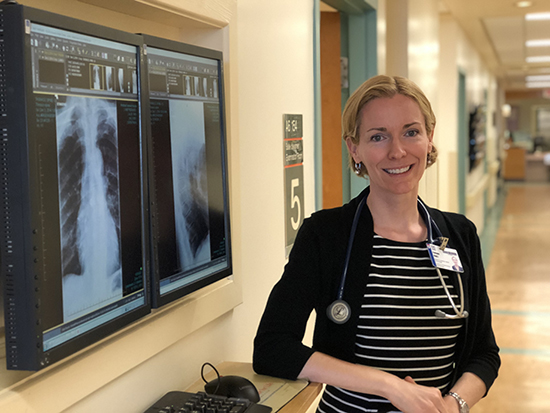Arthritis Drugs Potentially Safe for Expectant Mothers
A new study led by a team at the Research Institute of the MUHC (RI-MUHC) in Montreal has revealed that pregnant women with rheumatoid arthritis (RA) may be able to use certain RA drugs without possible increased health risks to their unborn babies. The research findings are published today in the journal Arthritis & Rheumatology.

Dr. Évelyne Vinet
Rheumatoid arthritis is a debilitating disease with physical, emotional, and economic consequences that afflicts about one per cent of the world's adult population. This autoimmune disease, which causes chronic inflammation of the joints and other areas of the body, affects two to three times more women than men and there is no existing cure.
Dr. Évelyne Vinet and her team from the Centre for Outcomes of Evaluative Research (CORE) of the RI-MUHC analyzed offspring exposed to tumour necrosis factors inhibitors (TNFs) – an immunosuppressant RA drug commonly used to reduce inflammation and relieve pain.
They did not observe any marked excess risk of serious side effects when compared to unexposed children from mothers with RA and children from the general population. Their research showed that although TNFs cross the placenta, the drug may not increase immunosuppression nor compromise the child’s ability to fight infections.
“Knowing there is not necessarily an association between infections and these RA drugs will be very reassuring to expectant mothers,” says first author of the study Dr. Vinet, who is a scientist from the Infectious Diseases and Immunity in Global Health Program at the RI-MUHC and an assistant professor in the Department of Medicine and Division of Rheumatology at the Faculty of Medicine of McGill University. “It is important to highlight these findings so would-be mothers understand they can enjoy a normal pregnancy without being burdened by unnecessary stress.”
Dr. Vinet's team studied nearly 3,000 children from mothers with RA (the largest cohort ever assembled) and a random selected group of nearly 15,000 children over the course of their first year of life. Within the RA group, 380 children were exposed to TNFs and 3.2 per cent presented serious infections. That number is just slightly above those with no TNFs (2 per cent) and the control group (1.9 percent).
“However, until further studies are conducted to address this issue,” says Dr. Vinet, “it is important to follow current recommendations when treating women with rheumatoid arthritis during pregnancy.”
About the Study
The study ‘Serious infections in rheumatoid arthritis offspring exposed to tumour necrosis factor α inhibitors’ was co-authored by Evelyne Vinet MD, PhD 1,2, Cristiano De Moura, PhD2, Christian A Pineau, MD 1, Michal Abrahamowicz, PhD 1, Jeffrey R. Curtis, MD, MS, MPH 3, Sasha Bernatsky, MD, PhD 1,2. 1 McGill University Health Center, Montreal, QC, H4A 3J1, Canada;
2 McGill University, Montreal, QC, H3A 0G4, Canada, 3 University of Alabama at Birmingham, Birmingham, AL, 35294, United States. DOI: 10.1002/art.40536.
This work was supported by the MUHC Department of Medicine. Dr. Évelyne Vinet is supported by a Fonds de Recherche du Québec Santé (FRQS) Clinical Research Scholar-Junior 1 Award.
About the Research Institute of the MUHC
The Research Institute of the McGill University Health Centre (RI-MUHC) is a world-renowned biomedical and healthcare research centre. The Institute, which is affiliated with the Faculty of Medicine of McGill University, is the research arm of the McGill University Health Centre (MUHC) – an academic health centre located in Montreal, Canada, that has a mandate to focus on complex care within its community. The RI-MUHC supports over 420 researchers and close to 1,200 research trainees devoted to a broad spectrum of fundamental, clinical and health outcomes research at the Glen and the Montreal General Hospital sites of the MUHC. Its research facilities offer a dynamic multidisciplinary environment that fosters collaboration and leverages discovery aimed at improving the health of individual patients across their lifespan. The RI-MUHC is supported in part by the Fonds de recherche du Québec – Santé (FRQS). www.rimuhc.ca.
Contact avec les médias :
Paul Logothetis
Communications Coordinator
McGill University Health Centre
[email protected]
